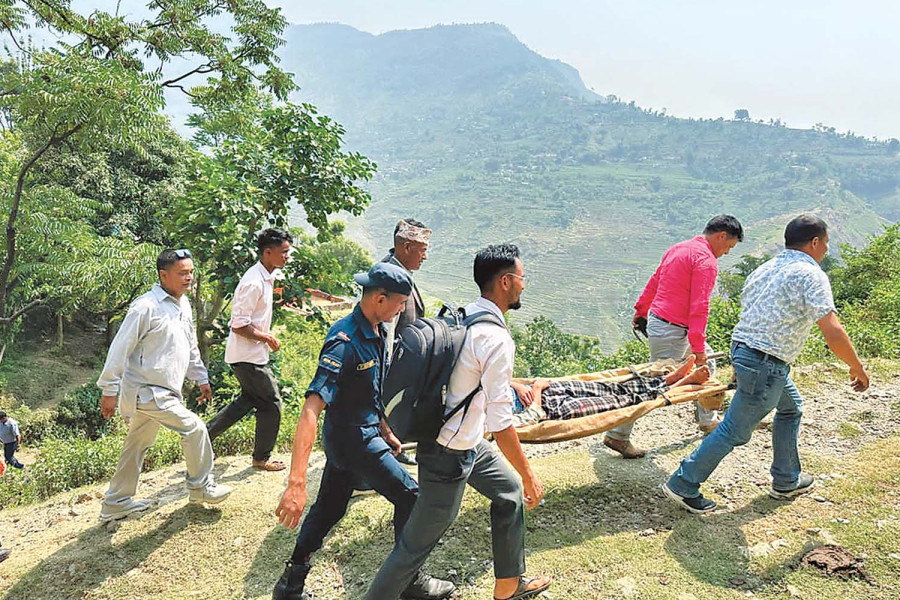Sudurpaschim Province
Girl raped in menstrual shed in Achham district, police say
Women are dying of asphyxiation or from snakebites. Many girls potential victims of rape in sheds over years.
Menuka Dhungana
A 16-year girl has been reportedly raped in a chhaugoth (menstrual shed) at ward 2 of Panchadewal Binayak Municipality, Achham.
According to Deputy Superintendent of Police Santosh Pathak, chief at the District Police Office in Achham district, a 17-year-old boy raped the victim at midnight on Monday. The girl had been staying in her maternal uncle’s house.
Police arrested the suspect, a distant relative of the victim, for investigation on Tuesday.
The victim, who was found in an unconscious state, was taken to the district hospital in Mangalsen on Tuesday afternoon. “The relatives and neighbours took the victim to the hospital stating that she was epileptic and had fainted. The crime was revealed after she regained consciousness,” said Pathak.
The girl regained consciousness three hours after arriving at the hospital. “It seems the victim was unconscious for around 12 hours. She was so traumatised that she could not talk for a long time even after regaining consciousness,” said Ganga Budha Magar, information officer at the hospital.
During a counselling session at the ‘One-stop Crisis Management Centre’ of the hospital, the victim revealed that the perpetrator raped her as she came out of the shed at around 2am to answer nature’s call. The victim’s relatives and the locals, however, remained tight-lipped, apparently, to conceal the crime.
The victim, who is now at the One-stop Crisis Management Centre, sustained injuries in her private parts, according to Budha Magar.
“We had to visit the incident site with the victim as the locals were reluctant to disclose information about the incident,” said a police officer involved in the investigation. “We found damaged maize plants just outside the chhau shed, and there were blood stains at the incident site,” he added.
An employee at the hospital quoted the victim as saying that the perpetrator covered her mouth and committed the crime. “She said that she heard two other people talking near to the incident site, but could not identify them,” the employee said.
The family members found the victim unconscious in the chhau shed when they went to check on her. She had not gotten out of bed till late in the morning. The locals did not go near the victim thinking that she fell unconscious due to the epilepsy and they would also catch the disease.
“I was informed about the incident when we were preparing to hold a municipal council meeting at around 10 am. We postponed the meeting and all the people’s representatives hurried to the incident site immediately,” said Ambika Chalaune, mayor of Panchadewal Binayak Municipality.
There was apparently a birthday party at her neighbour’s house. “The victim also went to the neighbour’s house, participated in the fanfare and returned late at night. She might have her monthly period after she returned from the party and went to the chhau shed. The perpetrator took advantage of the situation,” said Chalaune.
Chalaune further said that when she arrived at the shed the victim was lying unconscious. “When I inquired with the women, men and elderly people about the incident they univocally said that she had for long been suffering from epilepsy. The villagers were silent as if they did not know about the rape,” said the mayor.
The investigating officers later met the victim’s relatives and neighbours. Even the victim’s maternal grandmother and other relatives remained tight-lipped about the incident, reiterating that she lost consciousness due to epilepsy.
The chhaupadi tradition—an outdated social practice in which menstruating girls, women, and postpartum mothers are deemed impure and banished into seclusion for three days—is still prevalent in various districts of the Sudurpaschim and Karnali provinces. Incidents of sexual assaults and deaths caused by asphyxiation (during winter when they make woodfire to keep warm) and snakebite in chhau sheds are frequently reported.
As per the data available at the District Police Office, a total of 14 women and girls died in chhau sheds in Achham, a hill district of Sudurpaschim Province, since 2006. Two women died in Doti and three in Bajura under similar circumstances.
Four years ago, Parbati Budha Rawat, a 20-year-old woman from Siddheshwari in ward 3 of Sanphebagar Municipality of the district, died in a chhau shed due to asphyxiation from a woodfire she had lit to keep warm before sleeping.
After Parbati’s death, her brother-in-law Chhatra Rawat was arrested by the police. He had forced her to stay in the shed during her menstruation. But the police failed to build a strong case against him as nobody from the family or outside filed a complaint. Based on the police report, Chhatra was produced at the Achham District Court and was sentenced to just 45 days in prison for forcing the victim to live in the shed, said police.
The civil and criminal codes enforced in 2017 have criminalised chhau tradition. The practice is not only discriminatory against women, but also life-threatening. Reports of girls and women dying in chhau sheds from cold, suffocation, snakebites, and wildlife attacks surface regularly.
Clause 168 (3) of the Civil and Criminal Code provisions three-month jail and a fine of Rs3,000 for anyone who forces a woman to live in a chhau shed during menstruation. The punishment is more severe if the perpetrators hold public positions.
In 2020, the federal Ministry of Home Affairs directed administrations in 19 districts of Sudurpaschim and Karnali provinces to dismantle chhau sheds.
According to the District Administration Office of Achham, under the instruction of the federal Ministry of Home Affairs, more than 10,000 chhau sheds were torn down in 91 wards of ten local units of the district over a period of a month. Local people's representatives, police, and local residents came forward to support the campaign, but it was stopped after a couple of months.
Neither the police administration nor the local units gave continuity to the campaign.




 13.12°C Kathmandu
13.12°C Kathmandu















